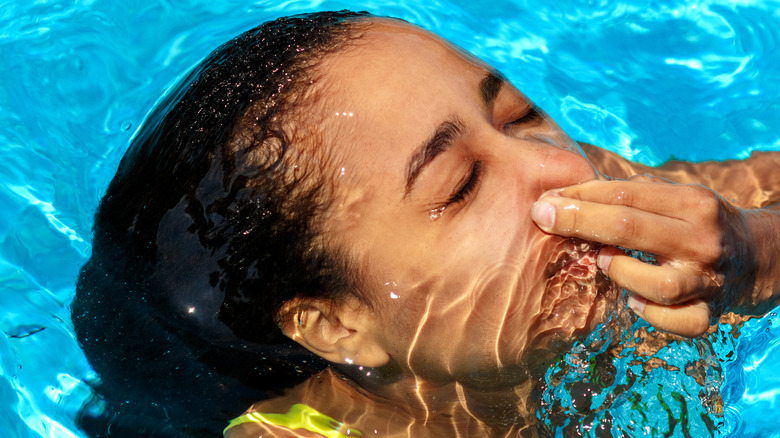What Happens When Water Accidentally Goes Up Your Nose
After waiting in a miles-long line at the water park, you're finally up next for the waterslide. Hooray! If you're someone who pinches your nose closed with your fingers as you plunge into the pool water below, consider yourself wise. Nothing ruins a day of fun in the sun more than a powerful stream of water shooting up your nose. Suddenly, you're left coughing, sputtering, and with an uncomfortable burning sensation rippling through your nostrils.
When pool water goes up your nose, the balance of salinity within our nostrils gets thrown off, explains Dr. Stacey Gray, director of the Sinus Center Massachusetts Eye and Ear, to STAT. Our body is made up of 0.9% saline, according to Discovery. While that may not sound like much, this small amount of sodium chloride helps maintain the careful balance of saline concentration within the cell membrane as well as outside the cell membrane. Pool water, which is low in salt, disrupts this balance within the cells of our nasal passages. To restore the equilibrium, water from inside the cell membrane is expelled out to the other side, leading to burning and discomfort. Dr. Gray further adds that when water abruptly makes its way up our nose, it stimulates the sensitive nerve endings inside our nasal passages. If the water is particularly cold, our nerves can interpret the shock of the temperature as pain.
Why neti pot water doesn't hurt our nose
So why don't we get that same shock response when using a neti pot? A neti pot is an apparatus that helps us breathe easier by ridding our nasal passages of blockages like allergens or mucus (via Cleveland Clinic). It does so by facilitating a steady stream of saline solution through one nostril and out the other. Unlike fresh water, because the solution contains salt, there's no saline imbalance occurring between the liquid and our cells. Even if the neti pot rinse contains greater amounts of salt than the concentration of saline in the body, this still works in our favor. A salty solution will leech excess water from the cells in our nose. This helps reduce swelling in the nasal passages and relieves related discomfort.
While a neti pot can certainly offer benefits for our health, are there any cases in which getting water up our nose can potentially be dangerous? We're glad you asked. Whether from a neti pot or a freshwater lake, there are instances in which water up the nose can put you at risk for infection.
Potential health risks of getting water up your nose
Without thoroughly cleaning and sanitizing your neti pot, any germs you spent time rinsing from your nasal passages can make their way back into your body with continued use of the contaminated device. But the return of a cold isn't the only risk to be aware of. Filling your neti pot with tap water instead of saline solution exposes the body to bacteria and other microbes. At worst, this can include Naegleria fowleri, sometimes referred to as a brain-eating amoeba (via Medical News Today).
Found in warm, freshwater sources, a brain-eating amoeba that makes its way up a swimmer's nose can cause a life-threatening infection known as primary amebic meningoencephalitis (PAM), according to the U.S. Centers for Disease Control and Prevention (CDC). Although quite rare, infection risk is highest during the middle-to-late summer months. Because submerging your head in water can increase the likelihood of water going up your nose, experts advise against jumping into lakes, rivers, or hot springs during the summer season. When swimming, pinch your nostrils shut, wear a nose clip, or refrain from going under water altogether. That, and remember to stick only with distilled water or saline solution when using a neti pot, advises the Cleveland Clinic.



